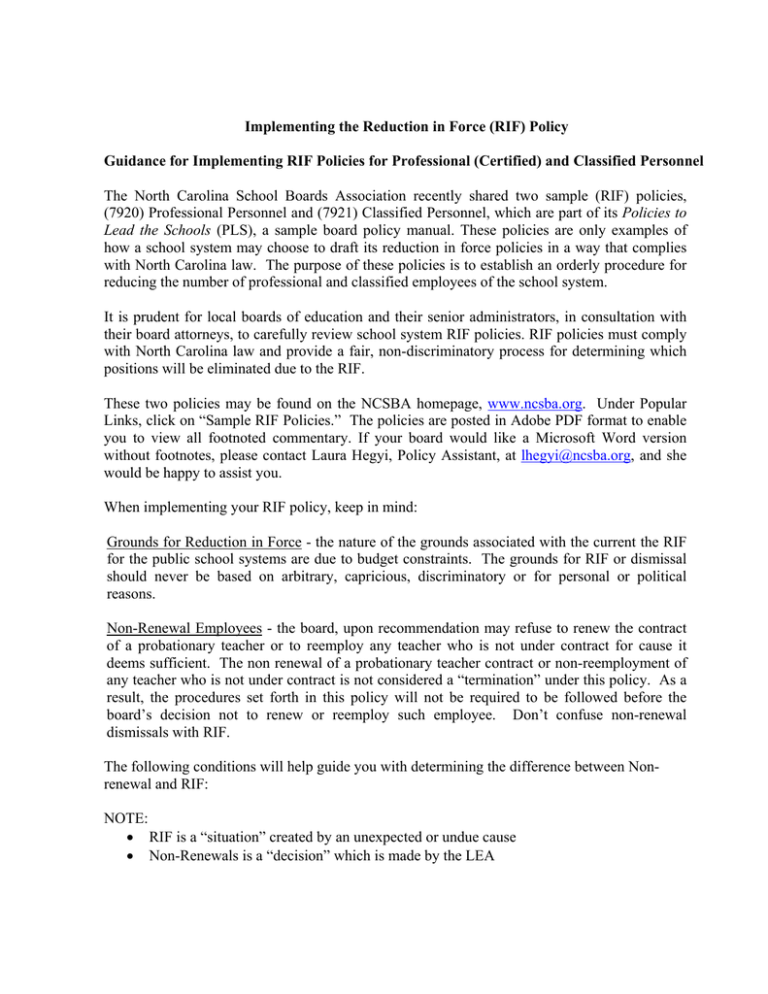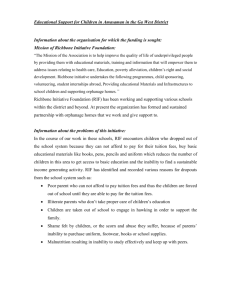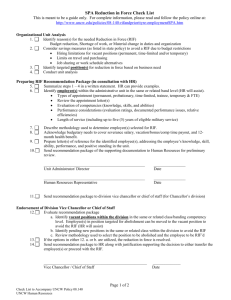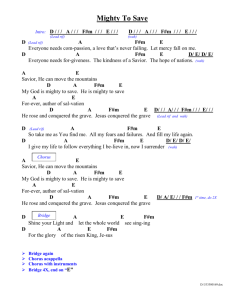Implementing the Reduction in Force (RIF) Policy
advertisement

Implementing the Reduction in Force (RIF) Policy Guidance for Implementing RIF Policies for Professional (Certified) and Classified Personnel The North Carolina School Boards Association recently shared two sample (RIF) policies, (7920) Professional Personnel and (7921) Classified Personnel, which are part of its Policies to Lead the Schools (PLS), a sample board policy manual. These policies are only examples of how a school system may choose to draft its reduction in force policies in a way that complies with North Carolina law. The purpose of these policies is to establish an orderly procedure for reducing the number of professional and classified employees of the school system. It is prudent for local boards of education and their senior administrators, in consultation with their board attorneys, to carefully review school system RIF policies. RIF policies must comply with North Carolina law and provide a fair, non-discriminatory process for determining which positions will be eliminated due to the RIF. These two policies may be found on the NCSBA homepage, www.ncsba.org. Under Popular Links, click on “Sample RIF Policies.” The policies are posted in Adobe PDF format to enable you to view all footnoted commentary. If your board would like a Microsoft Word version without footnotes, please contact Laura Hegyi, Policy Assistant, at lhegyi@ncsba.org, and she would be happy to assist you. When implementing your RIF policy, keep in mind: Grounds for Reduction in Force - the nature of the grounds associated with the current the RIF for the public school systems are due to budget constraints. The grounds for RIF or dismissal should never be based on arbitrary, capricious, discriminatory or for personal or political reasons. Non-Renewal Employees - the board, upon recommendation may refuse to renew the contract of a probationary teacher or to reemploy any teacher who is not under contract for cause it deems sufficient. The non renewal of a probationary teacher contract or non-reemployment of any teacher who is not under contract is not considered a “termination” under this policy. As a result, the procedures set forth in this policy will not be required to be followed before the board’s decision not to renew or reemploy such employee. Don’t confuse non-renewal dismissals with RIF. The following conditions will help guide you with determining the difference between Nonrenewal and RIF: NOTE: • RIF is a “situation” created by an unexpected or undue cause • Non-Renewals is a “decision” which is made by the LEA RIF Policy July 1, 2009 1.If the employer had all intention in renewing the contract and/or has verbally or written committed to a contract for the up-coming year and later changed commitment due to budget constraints, it is better to treat this as a RIF. 2. Probationary teacher’s contract is a year to year contract for up to 3 years with the recommendation being made in the fourth year. If the employer has a reduction in force before the year is up, this is considered as a RIF. 3. If it is at the end of the year and the contract was for one year and would have ended anyway -- this is not a RIF. This is just a contract which has met its duration. 4. If the contract is at the end of the year, for example a probationary teacher, the employer has decided not to renew the contract due to performance or other reasons other than budget constraints. This is not a RIF, a situation of this nature is a standard non renewal. 5. If the dismissal has been identified as a RIF, the employee shouldn’t be asked to resign. Files should be documented according to the action and situation. NOTE: When and if the LEA re-staff or reinstate the position(s), RIF employees should be given priority for consideration of reemployment. Results of RIF Action Health Insurance: Employees who have been employed twelve months or more and lose their job as a result of involuntary termination and a reduction in force (RIF) will continue to have coverage for twelve months by the SHP. Employees will be given the opportunity to continue coverage for their eligible dependents for this twelve month period. After this initial twelve months, former employees and their eligible dependents may continue on contributory basis or COBRA at a full cost. Employees employed less than 12 months is eligible for reduced COBRA for nine months. (See Reduction in Force and Health Insurance document) Link to NC State Health Plan http://www.shpnc.org/hbr-updates/february-2009/rif-and-health-care-coverage.html Note: First year teachers who are 10 months employee will not meet the guidelines to qualify for health insurance. Payouts: Based on policy 3.1.7 Separation from Employment under (a) Lump sum payment: An employee must be paid in a lump sum for accumulated annual vacation leave, not to exceed a maximum of 30 days or 240 hours, and bonus leave upon separation from service. Separation from service includes resignation (unless the employee is transferring to another LEA or state agency), dismissal, reduction-in- force, death, service retirement, beginning long-term disability benefit or change to temporary status. RIF Policy July 1, 2009 Military: Normally, the primary purpose of USERRA is to put employees in the same employment situation with respect to seniority and benefits that they would have been in had they not taken time off to serve in the military. USERRA addresses benefits, which is applicable as long as there is a position available. USERRA does not contain any provisions related to income maintenance; there are four areas in which USERRA does impose duties on employers who have employees absent on military leave: seniority and associated rights and benefits, health benefits, retirement benefits, and job security. Employees on active duty in sum, has no rights to reemployment under USERRA based on the following: • If the absence exceeds five years unless the excessive length of the absence is due to one of the specific reasons listed in the statute. You would need to know why the employee was on leave for over five years in order to determine if that employee has reemployment rights. • Under USERRA the employer is not required to reemploy or hold a position for an employee if "the employer's circumstances have so changed as to make such reemployment impossible or unreasonable." • Veterans who were RIF, should be given priority for consideration when and if the LEA reinstates the position(s) or advertises a similar position. Attached is the USERRA policy which addresses reemployment of military employees on active duty. Based on Title 38.4312(d)(1)(A) identify RIF as being impossible or unreasonable, which an employer is not required to reemploy or hold a position. Short Term Disability (STD): Under normal circumstances, the policy states, when an employee is out on STD and when there is a job to return to, the school system may hire a replacement teacher when the teacher is drawing disability and no longer using leave. It should be made clear to the position will not become permanent for the replacement. The position must be held open for the teacher out on disability. When there is a RIF involved and the position no longer exists due to budget constraints, the outcome changes. The employer is no longer required to hold the position. However, if the LEA reinstates the position, priority should be given to the individuals that were RIF. Family Medical Leave (FMLA): Under normal circumstances, Policy 8.2.23 states that an employee be reinstated to the same position held when the leave began or one of like position and pay grade, pay, benefits, and other conditions of employment. The LEA may require the employee to report at reasonable intervals to the LEA to discuss the employee’s status and intention to return to work. The LEA may require the employee provide certification that the employee is able to return to work. RIF Policy July 1, 2009 When there is a RIF, reinstatement is not required during the course of taking FMLA leave. The LEA has the burden of proving that the reduction would have occurred had the employee not been on FMLA leave. If you have questions or concern, please contact Joan Crump at jcrump@dpi.state.nc.us or (919)-807-3366. Please read the entirety and review all attached documents.






